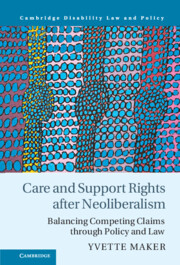Book contents
- Care and Support Rights after Neoliberalism
- Cambridge Disability Law and Policy Series
- Care and Support Rights after Neoliberalism
- Copyright page
- Contents
- Table
- Foreword
- Acknowledgments
- Abbreviations
- Introduction
- Part I Care Policy Tensions
- Part II Balancing Competing Claims through Rights-Based Policy and Law
- Part III Care and Support Policy Tensions in Two Liberal Welfare States
- 6 Income Support for Carers of Children with Disabilities in Australia
- 7 Care, Disability and Gender Equality in Australian Carers’ Income Support
- 8 Incorporating Multiple Options and Perspectives
- 9 Care and Support for Adults in England
- 10 Care, Disability and Gender Equality in English Care and Support Policy
- 11 Maximizing Options and Opportunities
- Conclusion
- Index
- Other Books in the Series
6 - Income Support for Carers of Children with Disabilities in Australia
Background and Recent Reforms to Carer Payment (Child)
from Part III - Care and Support Policy Tensions in Two Liberal Welfare States
Published online by Cambridge University Press: 21 April 2022
- Care and Support Rights after Neoliberalism
- Cambridge Disability Law and Policy Series
- Care and Support Rights after Neoliberalism
- Copyright page
- Contents
- Table
- Foreword
- Acknowledgments
- Abbreviations
- Introduction
- Part I Care Policy Tensions
- Part II Balancing Competing Claims through Rights-Based Policy and Law
- Part III Care and Support Policy Tensions in Two Liberal Welfare States
- 6 Income Support for Carers of Children with Disabilities in Australia
- 7 Care, Disability and Gender Equality in Australian Carers’ Income Support
- 8 Incorporating Multiple Options and Perspectives
- 9 Care and Support for Adults in England
- 10 Care, Disability and Gender Equality in English Care and Support Policy
- 11 Maximizing Options and Opportunities
- Conclusion
- Index
- Other Books in the Series
Summary
This chapter introduces the first of two case study analyses presented in the book. The case studies explore how the care policy tensions manifest in different policy contexts and demonstrate how the principles might be used to amend specific policies. This chapter describes the history and key features of an Australian care and support policy that prioritizes one activity (unpaid care) over another (paid work) and one constituency (carers) over another (children with disabilities). Carers’ income support has been available to some citizens and permanent residents since the 1980s. Since 1998, Carer Payment (child) – a pension payment administered by Australia’s federal government – has been available to people whose constant care for a child with a severe disability or medical condition prevents them from supporting themselves through paid work. The most recent major reforms to the policy in 2009 introduced a new eligibility test that focused on the ‘care load’ that a child’s medical needs produce for the carer. This extended access to a greater number and wider range of people, although the payment is still only available to those providing constant care and have no, or limited, involvement in paid work.
Keywords
- Type
- Chapter
- Information
- Care and Support Rights After NeoliberalismBalancing Competing Claims Through Policy and Law, pp. 139 - 149Publisher: Cambridge University PressPrint publication year: 2022



